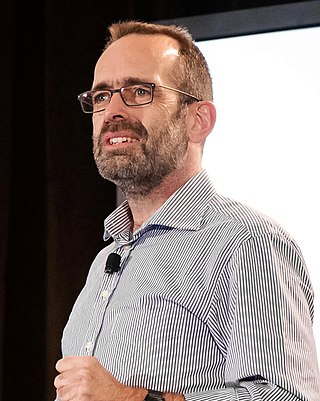Data mining is the process of extracting and discovering patterns in large data sets involving methods at the intersection of machine learning, statistics, and database systems. Data mining is an interdisciplinary subfield of computer science and statistics with an overall goal of extracting information from a data set and transforming the information into a comprehensible structure for further use. Data mining is the analysis step of the "knowledge discovery in databases" process, or KDD. Aside from the raw analysis step, it also involves database and data management aspects, data pre-processing, model and inference considerations, interestingness metrics, complexity considerations, post-processing of discovered structures, visualization, and online updating.

Elsevier is a Dutch academic publishing company specializing in scientific, technical, and medical content. Its products include journals such as The Lancet, Cell, the ScienceDirect collection of electronic journals, Trends, the Current Opinion series, the online citation database Scopus, the SciVal tool for measuring research performance, the ClinicalKey search engine for clinicians, and the ClinicalPath evidence-based cancer care service. Elsevier's products and services include digital tools for data management, instruction, research analytics, and assessment. Elsevier is part of the RELX Group, known until 2015 as Reed Elsevier, a publicly traded company. According to RELX reports, in 2022 Elsevier published more than 600,000 articles annually in over 2,800 journals; as of 2018 its archives contained over 17 million documents and 40,000 e-books, with over one billion annual downloads.

The Lancet is a weekly peer-reviewed general medical journal and one of the oldest of its kind. It is also one of the world's highest-impact academic journals. It was founded in England in 1823.

Signs: Journal of Women in Culture and Society is a peer-reviewed feminist academic journal. It was established in 1975 by Jean W. Sacks, Head of the Journals Division, with Catharine R. Stimpson as its first editor-in-Chief, and is published quarterly by the University of Chicago Press. Signs publishes essays examining the lives of women, men, and non-binary people around the globe from both historical and contemporary perspectives, as well as theoretical and critical articles addressing processes of gendering, sexualization, and racialization.
A Chief Data Officer (CDO) is a corporate officer responsible for enterprise-wide governance and utilization of information as an asset, via data processing, analysis, data mining, information trading and other means. CDOs usually report to the chief executive officer (CEO), although depending on the area of expertise this can vary. The CDO is a member of the executive management team and manager of enterprise-wide data processing and data mining.
SIGKDD, representing the Association for Computing Machinery's (ACM) Special Interest Group (SIG) on Knowledge Discovery and Data Mining, hosts an influential annual conference.
The Journal of Endocrinology is a monthly peer-reviewed scientific journal that publishes original research articles, reviews, and commentaries. Its focus is on endocrine physiology and metabolism, including hormone secretion, hormone action, and biological effects. The journal considers basic and translational studies at the organ and whole organism level.
Density-based spatial clustering of applications with noise (DBSCAN) is a data clustering algorithm proposed by Martin Ester, Hans-Peter Kriegel, Jörg Sander, and Xiaowei Xu in 1996. It is a density-based clustering non-parametric algorithm: given a set of points in some space, it groups together points that are closely packed, and marks as outliers points that lie alone in low-density regions . DBSCAN is one of the most commonly used and cited clustering algorithms.
In information science, profiling refers to the process of construction and application of user profiles generated by computerized data analysis.

Studia Logica, is a scientific journal publishing papers employing formal tools from Mathematics and Logic. The scope of papers published in Studia Logica covers all scientific disciplines; the key criterion for published papers is not their topic but their method: they are required to contain significant and original results concerning formal systems and their properties. The journal offers papers on topics in general logic and on applications of logic to methodology of science, linguistics, philosophy, and other branches of knowledge. The journal is published by the Institute of Philosophy and Sociology of the Polish Academy of Sciences and Springer publications.
The Design Research Society (DRS), founded in the United Kingdom in 1966, is an international society for developing and supporting the interests of the design research community. The primary purpose of the DRS, as embodied in its first statement of rules, is to promote ‘the study of and research into the process of designing in all its many fields'. This established the intention of being an interdisciplinary learned society, taking a scholarly and domain independent view of the process of designing. Membership is open to anyone interested in design research, and members with established experience and a strong background in design research may apply to be elected as a DRS Fellow.

Usama M. Fayyad is an American-Jordanian data scientist and co-founder of KDD conferences and ACM SIGKDD association for Knowledge Discovery and Data Mining. He is a speaker on Business Analytics, Data Mining, Data Science, and Big Data. He recently left his role as the chief data officer at Barclays Bank.
Geoffrey I. Webb is Professor in the Department of Data Science and Artificial Intelligence at Monash University, founder and director of Data Mining software development and consultancy company G. I. Webb and Associates, and former editor-in-chief of the journal Data Mining and Knowledge Discovery.

Gregory I. Piatetsky-Shapiro is a data scientist and the co-founder of the KDD conferences, and co-founder and past chair of the Association for Computing Machinery SIGKDD group for Knowledge Discovery, Data Mining and Data Science. He is the founder and president of KDnuggets, a discussion and learning website for Business Analytics, Data Mining and Data Science.
Domain driven data mining is a data mining methodology for discovering actionable knowledge and deliver actionable insights from complex data and behaviors in a complex environment. It studies the corresponding foundations, frameworks, algorithms, models, architectures, and evaluation systems for actionable knowledge discovery.

Mark S. Boguski was an American pathologist specializing in computational analysis and structural biology. In 2001, he was elected to both the U.S. National Academy of Medicine and the American College of Medical Informatics.
Climate Policy is an interdisciplinary peer-reviewed scientific journal publishing research and analysis on all aspects of climate change policy, including both mitigation and adaptation. It was launched in 2000 and is published ten times per year by Taylor & Francis. The current Editor is Pieter Pauw, and the Editors-in-Chief are Navroz Dubash and Yacob Mulugetta. According to the Journal Citation Reports, the journal has a 2022 two-year impact factor of 7.1. It is ranked 3rd out of 49 in the Public Administration ranking and 18th out of 127 in Environmental Studies. The journal works closely with its Associate Editors and Editorial Board, whose international membership reflects a wide range of expertise in climate policy research, as well as policy making and implementation.

Martin Ester is a Canadian-German Full Professor of Computing Science at Simon Fraser University. His research focuses on researcher data mining and machine learning.

Hui Xiong is a data scientist. He is a distinguished professor at Rutgers University and a distinguished guest professor at the University of Science and Technology of China (USTC).

Michael R. Berthold is a German computer scientist, entrepreneur, academic and author. He held the chair for bioinformatics and information mining at Konstanz University, and is an honorary professor at Óbuda University. He is also the co-founder of KNIME, and is serving as a president and CEO of KNIME AG since 2017.










